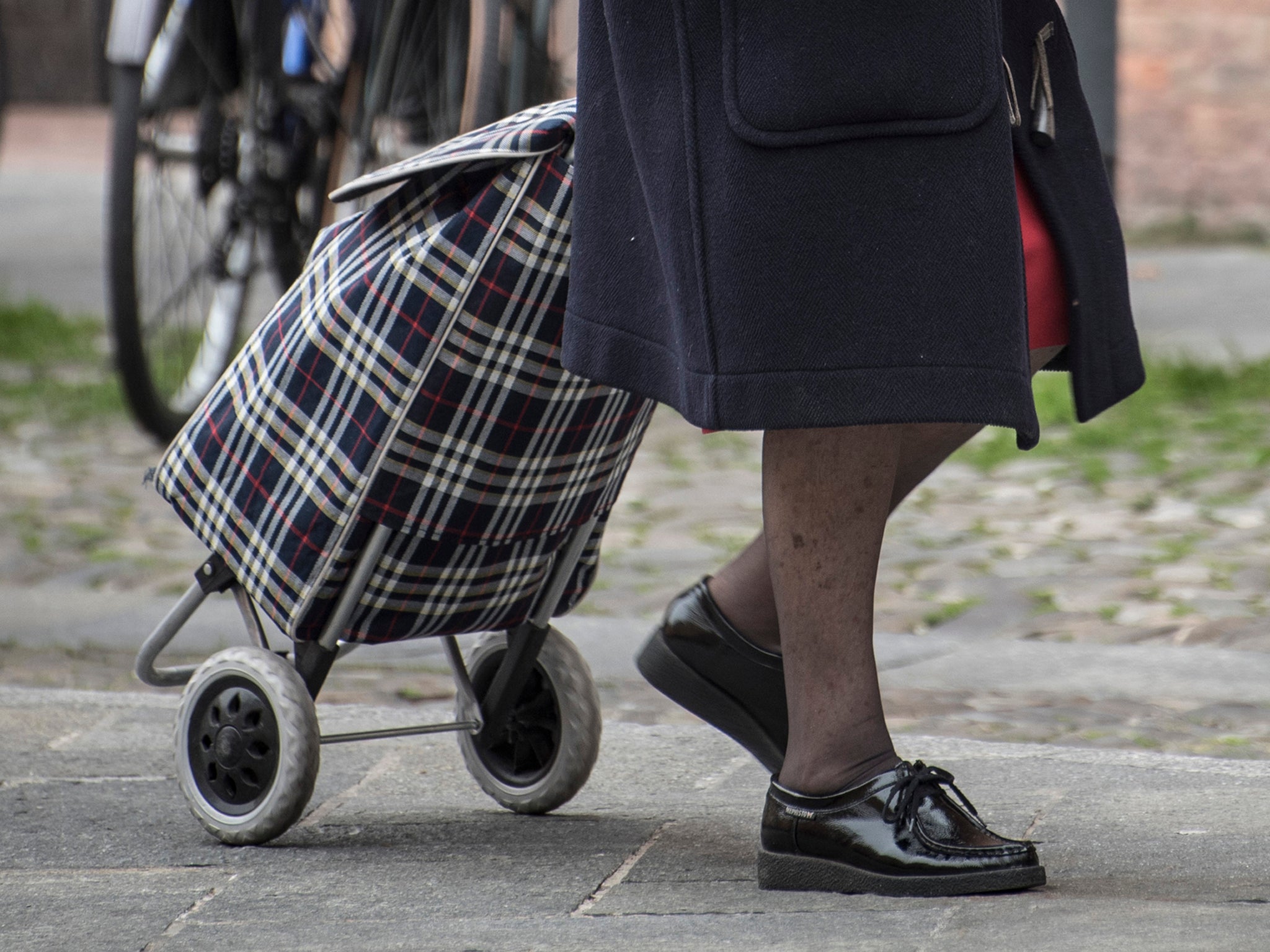Goodbye, Wendy: A short story about kindness to brighten your day
For World Kindness Day, Heather Martin shares a story about an elderly woman, a kind friend and a hard goodbye


“Goodbye, Wendy” is one of more than 50 short stories by authors across the literary spectrum included in Everyday Kindness, a charity anthology edited by bestselling mystery and thriller writer L J Ross. Each story captures a moment of goodwill inspired by others, and was conceived in direct response to the Covid-19 crisis as a means of fostering positive mental health and rekindling hope in dark times.
He was the main reason they went there. Not the only one, of course. It had a great vantage point on the crossroads, with a natural sun trap on the triangular concrete oasis outside, and a view down the facing street to patches of green and the church steeple beyond. The sandwiches were pretty good too. Choose-your-own fillings, wonky bread, Turkish or sourdough, never the same twice, all jammed together in the toaster but most likely falling apart on your plate, so you had to lick your fingers to get all the goodness from them. Red pesto or green, spicy or mild, all homemade and all just how you wanted it.
It was that kind of place.
But still, he was the main reason. There was just something about him. Didn’t matter who you were. The bike shop guy from under the railway bridge. The music heads from the studio next door. The tattooist-to-the-stars from around the corner. The two French girls with pale skin and jet black hair who sat side by side in the pull-down cinema seats at the front window. The old couple and their dog – a scruffy little scavenger who’d seen better days – who liked to tackle the crossword over tea and toast. Marv, who’d been coming in so long he had a sandwich named after him and whose preferred flavour of crisps had changed only once in two decades. Joe treated them all the same. Had a way of making you feel he had all the time in the world just for you, but whoever was behind you in the queue didn’t get riled up about it, because, well, he had all the time in the world for them too. No one knew how he did it, really. It was magic but without the trickery. None of that hoo-hah with smoke and mirrors.
Nice smile, too. And generous with it. If from time to time he made a mistake – let’s face it, none of us is perfect – there was no blame and no bluster. He never tried to cover it up or brush it under the carpet. “Sorry, man,” he’d say, and start over, so when whatever it was turned up it tasted better than if he’d got it right in the first place. Like a bonus ingredient, an added dash of humanity thrown in with the cheese and tomato. He was only a young lad, mid-twenties, at a guess. Friendly, but not flashy.
Wendy was a regular. Most people were, come to think of it. She’d pass most days, left to right across his field of vision on her way to the shops, then right to left on her way back again, hunched over a stick, pulling a powder-blue shopping trolley behind her patterned with a recurring Scottie dog print. Always on her own. Didn’t buy much, so far as he could see. Maybe a loaf of bread and a carton of milk to go with the extra-long cigarettes she picked up from the post office on the high street. Some Russian brand, he thought. She was always smartly turned out. Her dyed brown hair backcombed and set with rollers. Fire-engine red mock-croc shoes with a silver buckle over the instep and a bit of a point to them. Matching smear of red lipstick. A large-link gilt chain dangling across the front of her blouse. A proper overcoat whatever the season. All nice and laundered. Not that she had her own washing machine. Only faith that whoever she ran into at the laundrette would see her right: popping the coins in the slot, topping the machine up with detergent, and folding everything neatly into the trolley at the end.
Between shifts, or sometimes on his day off, Joe and Wendy liked to shoot the breeze outside over one of her bootleg cigarettes and, for her, a cup of milky tea with one sugar. Joe was still smoking in those days. They made an odd couple. Her all of 4ft11 and seamed with wrinkles like her shoes; him 6ft and counting, swimmer’s physique, smooth-skinned and close-cropped. Wendy was a sociable soul. Used to her own company, mind, what with her husband disappearing off the face of the earth fifteen years before. Hightailed it back to Burma, she reckoned. Hadn’t seen hide nor hair of him since. Some fancy woman, most likely. She’d put good money on it – either that or a sentimental tour of the old POW camp. Wendy’s laugh was loud, like her voice, just this side of abrasive, and always liable to crescendo into a fit of coughing. She had a son, holed up in some assisted living place, no one was quite sure why. Might as well be in Burma, for all the interest he had in his mother.

She told Joe how when she got home she would make toast and turn on the telly. He told her how when he wasn’t making sandwiches he ran music nights at the local church – big, largely unused space like most churches, but different from most because the pews weren’t fixed to the floor and could be moved into a circle, creating a stage in the round, which was magic. There was hot food too, made by a local Ethiopian family who ran a restaurant down the road. She should come along sometime. Ask for Joe at the door. Dinner on him. Wendy was up for that, a night out on the town in her pointy red dance shoes, and had it all lined up too, till her son stood her up.
One day, just like her truant husband, Wendy disappeared. No one noticed at first. The guy who’d been buying the same sandwich for 20 years was still showing up regular as clockwork, a Marv on the go as soon as he stepped foot through the door. The tattoo guy, the bike shop guy, the two French girls, the old couple with the scruffy dog: all present and correct. The crossword was still getting done, punters chipping in a speculative word here and there as they came and went. But there was something subtly off about the rhythm of his days. The beat was no longer steady. There was a flicker on the screen, a tiny blip on the monitor.
Then a woman passed in front of the window, left to right across his field of vision as he stood behind the counter ready to serve the next customer, smiling, but inwardly pensive. It wasn’t Wendy, but it was someone Wendy knew, following Wendy’s route. This woman never came in, but he’d seen the two of them stop and exchange greetings. “You seen Wendy lately?” Joe asked, ducking outside. The guy waiting for his sandwich wasn’t worried. He knew Joe would be back soon enough, with all the time in the world for him too.
But the woman hadn’t seen Wendy, and nor had anyone else he asked as the days went by, the rhythm faltering more noticeably now, the vital signs dipping like the sun dropping behind the horizon.
One day, just like that, Joe went looking for Wendy. He’d finished his shift. It was about two in the afternoon. He didn’t know where she lived, but he turned left out of the cafe down the slope under the railway bridge, and on a hunch, left again, into the nearest estate. She walked with a stick, right? How far was she going to go for a loaf of sliced bread and some fags? Eventually, someone buzzed him in to the first building and he started knocking on doors. A lot of doors, one after the other like he was canvassing for the Labour Party. Only a few surly brush-offs. Most people reacted like he was offering to make them the sandwich of their dreams.
“Hello,” he would say. “Do you know Wendy? She’s my mate, and I haven’t seen her in a while, and I’m looking for her. I think she might live around here.”
The description was easy. Everyone knew Wendy. No one knew where she lived.
The second building had the same smell, mould and decay hanging heavy in the air. Same mix of hope, hunger and indifference. Then Joe stumbled across the woman from outside the cafe, the one who never came in, who didn’t know where Wendy lived either but pointed vaguely to the next block along.
The first door he tried, a thick-set man opened up and said “yeah, I think she’s on the top floor”, jabbing his thumb upwards in the direction of the nearest staircase. No lift that Joe could see. His head hurt. He could hear the slow tap of the stick on each concrete step, the irregular thump of the trolley as she dragged it up behind her, Scottie dogs bouncing merrily. The cough jangling like an out-of-tune guitar. The thick-set man hadn’t seen Wendy. “Been wondering if she died,” he said. “F***ing stinks in here.”
Joe took two steps at a time, heart thumping. He was there to find Wendy. Tried not to think about what might await him when he did. Tried not to breathe the foul air. He’d never seen a dead body. Didn’t know what death smelled like. One thing he did know was he hated the thick-set man. He knew that for certain.
There weren’t many people Joe hated.
He rapped his knuckles on the first door. A woman opened. Said nothing. Shook her head and shut the door on him like she didn’t want to know. Joe swivelled. Knocked on the facing door. Waited. No answer. Knocked again. Nothing. Something stirred in his gut.

He bent down, pushed open the flap of the letterbox and peered through the narrow horizontal gap. To his right, a bathroom covered in grime. Put his own housekeeping skills in perspective. To his left, what looked like a bedroom. Straight ahead, a television, one of the old tube monsters, squat and bulbous, switched on but not showing a programme, filling the hallway with eerie blue light.
He called Wendy’s name. Silence, apart from a faint electric hum. Called again. No rasping cough. No tapping stick, no dancing shoes.
He stood up. Bent down, took another look. Waited for his eyes to adjust to the glare. Then saw it. A jaunty repeat pattern. The powder-blue leached out by the virulence of the screen. The Scottie dogs, no longer bouncing, but watchful, patient. They’d wait forever if they had to. It’s what dogs do. Wait till help comes.
Joe closed the flap softly. Stood up, took out his phone, and dialled the non-emergency number. The dogs weren’t barking. Didn’t look like an emergency to them, either. Someone picked up and Joe said: “I work at the cafe on the crossroads. You know, the one on the corner. I was looking for my mate, Wendy. She’s an old lady and I haven’t seen her in a while. I think I’ve found where she lives. I think she might be dead.”
Someone would be right along, they said. His head was ringing. They gave him a rough ETA. Time to get out, breathe some air, buy a beer maybe. Sit on the wall and have a cigarette. Just a roll-up, no fancy Russian knock-offs for him. None for Wendy anymore either. Time for a mate to pass by, do a double-take and sit down on the wall beside him and ask what was up. Time to tell him. Time for the mate to go on about his business. For the sun to set. For Joe to pull out his phone and ring the non-emergency number again and ask if they were still coming. He got that it wasn’t urgent, but all the same.
They were nice, when they turned up, the two officers. Two mid-thirties men in uniform, brisk and efficient. Concerned for his welfare. They buzzed a random number and said: “Police. Open up, please.” Joe took them up the two flights of stairs to the third floor and they picked the lock, gently. Told him to stay outside. Went in, came straight back out again, and said: “You were right. That’s the smell of a dead body.”
Joe cried, then.
“We found her lying in bed,” one of the officers said. “Like someone just switched off the light.”
He went home. He never did get a response from the son in the assisted living place. Never did hear about the funeral. The police were sympathetic. But there was nothing they could do, they said. Nothing more they could tell him, even if they knew. There were procedures and protocols. It was a family matter now.
“I don’t know if there even was a funeral,” he told me back at the cafe. We were sitting outside in the sun in a lull between the lunch and evening crowds. Mine was a Marv. A new Marv, actually. No questions asked, but for some reason the guy had switched up from cheddar to goat’s cheese. Everyone was OK with it. I was a fan.
Joe had a roll-up. Stretched out his long legs and turned his face up to the sky. We had all the time in the world.
Everyday Kindness: A collection of uplifting tales to brighten your day is released on World Kindness Day, November 13th. All proceeds from the book across all formats will be donated to Shelter, a charity that helps millions of people a year struggling with bad housing or homelessness. The book can be ordered here.




Join our commenting forum
Join thought-provoking conversations, follow other Independent readers and see their replies
Comments